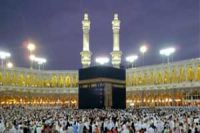 The powerful presence of Islam on the international scene is proof of dynamic and universal nature of this divine religion.
The powerful presence of Islam on the international scene is proof of dynamic and universal nature of this divine religion.
The ethereal teachings of Islam have always preserved their freshness and exuberance in every era and place. Indeed, the perfectly flawless personality of the Almighty's Last and Greatest Messenger to mankind, Prophet Mohammad (blessings of God upon him and his progeny) shows that Islam is the immortal religion of all human beings.
As Islam has so wonderfully defined, the journey to the symbolic House of the Unseen but Omnipresent God for carrying out the Hajj rituals is among the ways of progress of mankind towards perfection and loftiness. The annual Hajj is the story of rediscovering one's own self. This spiritual journey so thoroughly transforms the spirit that many Hajj pilgrims have written down their wonderful experience for the benefit of others. Among them is a group of German pilgrims who recently performed the Hajj. One of them, called Saleem, has written in his memoirs of his journey to the holy Ka'ba in Mecca:
"I accompanied the last group of pilgrims who rode on the bus. Unlike the other trips, there was a friendly and spiritual atmosphere in the bus. I took a seat beside a pilgrim from Luneburg from Saxony in Germany. Some pilgrims shed tears of joy for being fortunate to perform pilgrimage to the House of God. Every pilgrim understands the philosophy behind the Hajj and benefits from it.
From the viewpoint of pilgrims, the Hajj is a move towards the proximity of God. The Hajj is manifestation of universal brotherhood which Islam has created. Everything starts from keeping away from one's attachments.
Saleem wrote: we stopped at the Masjid ash-Shajarah or the Mosque of the Tree, which is the Miqaat or place of donning the Ehraam for pilgrims coming from Medina. Pilgrims coming in from other directions and cities have other Miqaats for formally making the intention to perform the pilgrimage while taking a ritual bath and donning the Ehraam.
These miqaats are actually gates for the guests of God Almighty proceeding towards God's symbolic House in Mecca, the holy Ka'ba. By putting aside their colorful clothes and wearing the white shroud-like two piece Ehraam the pilgrims display the reality that all are servants of God, without the difference of class, colour, creed, caste, or language. In other words, no one is superior to anyone else. All are equal in the presence of the Lord Most High.
When Prophet Mohammad (blessings of God upon him and his progeny) journeyed to the ethereal heavens in the course of a part of a single night, on what is known as Me'raj or ascension, he heard a heavenly voice saying: Didn't your God find you orphan and gave you shelter; didn't your God find you lost and guided you?
In reply, the Prophet said Labbaik Allahomma Labbaik, which means: Here I am, O Allah! Here I am.
The German pilgrim Saleem writes in his travel account: I can say that the most pleasant anthem in that divine atmosphere is the chanting of this wonderful phrase 'Labbaik' by the pilgrims, almost in unison. This moving and awe-inspiring phrase that hundreds of thousands of pilgrims chant indicates their spiritual readiness for responding to God's call.
Pilgrims say from the depth of their heart: Here I am O Allah! Here I am. Here I am; there is no partner for You; here I am. Indeed praise, blessings and the whole universe belong to You. There is no partner for You, here I am.
This pleasant anthem removes the curtain between the Creator and the creatures and the pilgrims feel the mercy of God.
Saleem says a Muslim scholar in his book had written that during the Me'raj, every step that the Prophet took, a curtain of perfection appeared before his eyes. In the Hajj too, when the pilgrim puts on the Ehraam, the gates of perfection are opened for him or her. According to hadith, when the pilgrim steps into the precincts of the House of God, the divine angels welcome him since for undertaking this spiritual journey.

















